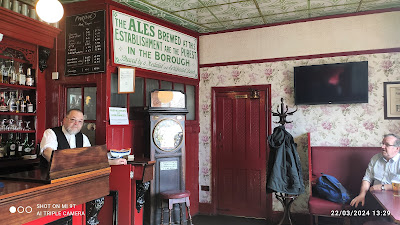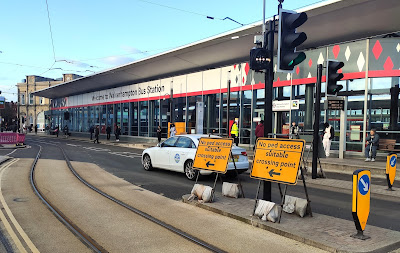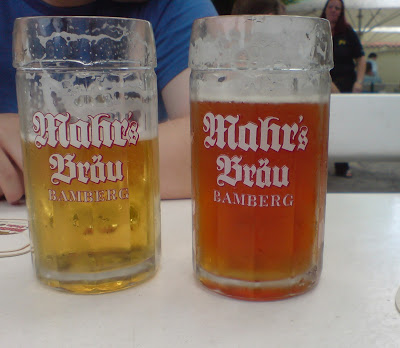A pint of Batham’s Best Bitter for me and a pint of the brewery’s mild for Paul. Just £2.60 a pint, and a couple of the best beers I’ve drank in a long, long time. Smooth, creamy, well-conditioned, clear as a bell and topped with a white creamy head that clung to the glass leaving “lacings” as the contents were eagerly drained by both Paul and me. It was beer heaven, as far as I was concerned, and I know my companion was equally enthusiastic about this marvellous beer.
Paul went off to order some food, leaving me at a table, in the large room to the left of the lobby, which we shared with a couple of other appreciative Batham’s drinkers. Not long after, our lunchtime meal arrived - steak pie, chips and mushy peas for me, and faggots, gravy, chips, and mushy peas for Paul. Both meals came in at just £5.00 each, which was amazing value. Most of the pub regulars, of which there were many, were eating as well, but with a large room at the rear, plus a staunchly traditional bar at the front, there was plenty of room for everyone. After finishing our meal, we too moved to the latter room, in order to soak up the atmosphere of this amazingly unspoilt local, which judging by the queue outside. All too soon it was time to move on and so we retraced our footsteps back towards the huge Merry Hill shopping complex, where after a shot wait, we boarded a bus that was travelling in the direction of Dudley. This dropped us at Netherton, where we alighted, and crossed the road to the second pub of the day, the legendary Old Swan, known locally as Ma Pardoe’s. The Old Swan is one of the four surviving home-brew pubs that were around at the time that CAMRA was founded, the other three being the Blue Anchor, Helston, Cornwall, the Three Tuns, at Bishop’s Castle, Shropshire, and the All Nations at Madeley, also in Shropshire. The latter is now the only one of those four historic pubs, that I have not been to. Last Friday’s visit to Ma Pardoe’s, was another first, and it was definitely worth visiting. As with the other pubs, Stafford Paul had done his homework, and discovered that the “wonderfully evocative original bar, unchanged since Victorian times” doesn’t open nowadays until 5pm. Tim Newey, who is the long-serving licensee at the Old Swan, told him that “most of the bar customers are dead now," although anyone particularly interested can sit in there having bought their pints in the 1980s extension next door. The exterior of the extension can clearly be seen in the photograph below and looks like it may have once been a separate building. We followed Mr Newey’s suggestion and after purchasing our pints of Olde Swan Original, asked the barman if we could take them through to the original section of the pub. He escorted us round, and left us to admire the interior, which is virtually unchanged from Victorian times. It features an ornate, enamelled ceiling, with a picture of a Swan, and this gracious bird also features on a mirror behind the bar. A standalone burner provides the heating. There is a cosy snug, plus a two-room lounge in the newer section of the pub.Paul and I were just sitting there enjoying our pints, when a WhatsApp message came through from Retired Martin, informing us that he was in the Swan, but where were we? We put him straight, as to our whereabouts, and he came through an joined us. He had done well in catching us up, particularly in view of his dislike of buses, and it was good that he was able to join up with us at Netherton. We enjoyed listening to his various escapades, but regrettably there wasn’t time for a further pint at the Old Swan. I mentioned earlier that we were on a tight time schedule, and this was because the Beacon Hotel at Sedgley, the next pub on our itinerary still keeps old fashioned hours, and closes at 3pm, for an afternoon break. Although we had 75 minutes to reach the Beacon, the journey involved a change of buses in Dudley. The traffic was also heavy, after all it was Friday afternoon, but there were road works as well. With time ticking away, there was a danger we might not make it to the pub before it closed for the afternoon.Martin came to the rescue and jumped off the bus a few stops before we reached Sedgley. He then gallantly power-walked to the pub, arriving several minutes ahead of us. When Paul and I eventually reached the pub, we found Martin waiting there along with three dimple pint mugs of Sarah Hughes Ruby Mild on the table. This 6% abv dark mild, was a good beer on which to finish the lunchtime session, although I was admittedly quite taken aback by the strength of this ale, which is one of several brewed on the premises, at the tower brewery at the rear of this characterful pub. The beers are served from a small central hatchway, complete with leaded windows, and we caught up with our friend in one of the adjoining rooms, which was still busy with drinkers finishing off their pints. When I visited the Gents, I noticed a couple of doors marked Brew-House and Fermenting Room, and as you can see from the photo, the brew-house is housed in a substantial red-brick building to the rear of where we were sitting. Sadly, it was time to drink up and say goodbye to the Beacon, and also to Martin, who had an engagement that evening, back home in Sheffield. It was good of him to have taken the time and effort to join us, although it’s a pity he wasn’t able to continue the crawl, as there were still two more cracking pubs to go. You can read about these in the next, and final post from this Black Country Walkabout.



















































